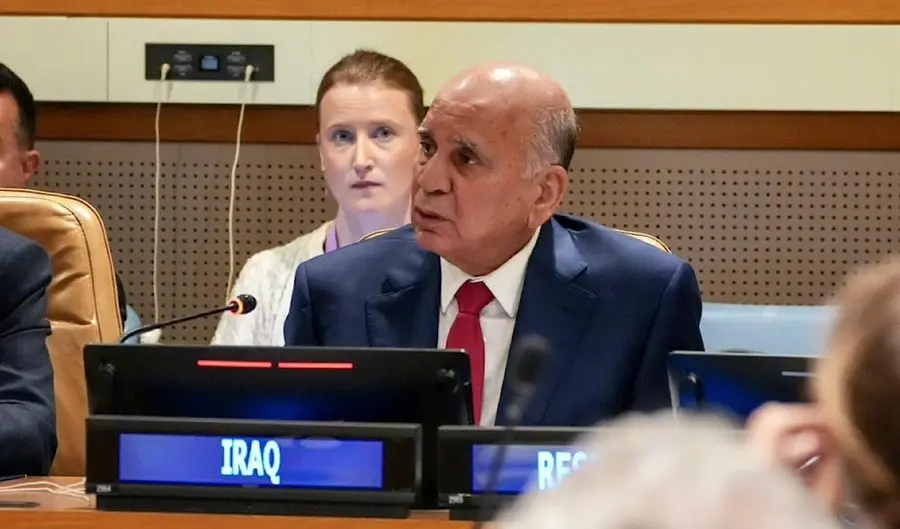
SOUTH AMERICA
Written by Stylo News: AI-Powered, Multi-Source Global News

Images © their owners, publicly available, for informational purposes.
Map of Events
Events occurred primarily in Iraq, Gaza Strip, and at the United Nations General Assembly in New York City, reflecting escalating tensions in the Middle East involving Israel, Iraq, and Palestine.
Locations
Event Updates
Iraq Condemns Netanyahu's Threats Against Iraqis Amid Regional Tensions
Executive Summary
On September 26-27, 2025, Israeli Prime Minister Benjamin Netanyahu made threatening remarks at the United Nations General Assembly in New York, warning that Israel would target militias in Iraq. Iraq's Foreign Minister Fuad Hussein condemned these remarks as unacceptable and a violation of international norms, emphasizing that any attack on Iraqis is an attack on all Iraq. Concurrently, the Iraqi resistance group Hezbollah al-Nujaba dismissed Netanyahu's threats as hollow and reaffirmed their opposition to Israeli aggression. The tensions escalated after the Iraqi Resistance claimed responsibility for a drone strike on an Israeli strategic site in the port of Eilat. The Iraqi government and resistance groups are united in rejecting Israeli threats and warning against further escalation.
Situation
The situation stems from ongoing conflict dynamics in the Middle East, where Israel is engaged in military operations in Gaza and has expressed intent to deter Iranian-backed militias in neighboring countries, including Iraq. Netanyahu's speech at the UN was met with protests and walkouts by many delegates, signaling international disapproval. Iraq's Foreign Minister Fuad Hussein's statements underline Baghdad’s firm stance against Israeli aggression and its commitment to defending its citizens. Hezbollah al-Nujaba's spokesperson, Hussein Ali Nur al-Musawi, labeled Netanyahu as the world's biggest terrorist and condemned his remarks as violations of international law. The drone strike by Iraqi Resistance on Eilat marks a significant escalation, potentially provoking further military responses. This event is part of a broader regional conflict involving Israel, Palestine, and allied groups in the Middle East.
International Impact
Netanyahu's threats and the subsequent Iraqi condemnation have heightened regional tensions, drawing international attention to the conflict's potential to destabilize the Middle East further. The UN General Assembly witnessed an unprecedented walkout by delegates during Netanyahu's speech, reflecting widespread global condemnation. These developments may influence international diplomatic relations, with countries reassessing their positions on the Israel-Palestine conflict and Iraq's security. The rhetoric and military actions could impact peace efforts and humanitarian conditions in the region.
Decision Maker Perspectives
Iraq Foreign Minister Fuad Hussein: Condemned Netanyahu's threats as unacceptable and emphasized national unity against any attack on Iraqis.
Hezbollah al-Nujaba (Iraqi Resistance): Dismissed Netanyahu's threats as hollow, condemned them as violations of international norms, and reaffirmed resistance against Israeli aggression.
Israeli Prime Minister Benjamin Netanyahu: Asserted Israel’s right to target militias in Iraq to deter Iranian influence and maintain security.
Source Perspectives
teleSUR English: Reported on Iraq's official condemnation and the Iraqi resistance's rejection of Netanyahu's threats, highlighting regional opposition to Israeli actions.
Al Mayadeen - Hispan TV: Provided detailed coverage of the diplomatic and militant reactions to Netanyahu's statements, emphasizing the escalation in tensions.
Israeli Prime Minister Netanyahu Declares Intent to 'Finish the Job' in Gaza Amid Escalating Violence
Executive Summary
On September 26, 2025, Israeli Prime Minister Benjamin Netanyahu addressed the United Nations General Assembly in New York, declaring that Israel must 'finish the job' in Gaza as soon as possible. This statement came amid intensified Israeli military operations in Gaza, which resulted in the deaths of at least 60 Palestinians on that day alone, with 30 casualties reported in Gaza City. Hospitals in Gaza reported severe impacts from continuous airstrikes, with the UN Office for the Coordination of Humanitarian Affairs noting an airstrike approximately every eight to nine minutes over 24 hours. The speech was met with a historic protest, as a majority of UN delegates staged a walkout, underscoring global outrage over Israel's actions. Palestinian medical officials also reported 13 deaths among civilians seeking aid, and an independent UN inquiry suggested that Israel's actions in Gaza may constitute genocide.
Situation
The situation reflects a significant escalation in the Israeli-Palestinian conflict, with Israel conducting a ground operation in Gaza since September 16, 2025. Netanyahu's speech at the UN was intended to justify ongoing military actions aimed at dismantling Hamas and other groups in Gaza. The unprecedented walkout by UN delegates during his address highlighted the international community's condemnation of the violence and humanitarian crisis. The death toll and destruction have exacerbated tensions, with many countries recognizing Palestinian statehood and condemning Israel's policies. The conflict has drawn widespread media attention and calls for ceasefire and humanitarian access.
International Impact
Netanyahu's remarks and the ongoing conflict have intensified diplomatic isolation for Israel, with multiple countries condemning its actions and recognizing Palestinian statehood. The UN General Assembly walkout is a stark signal of international disapproval. Humanitarian organizations have raised alarms over civilian casualties and potential war crimes. The conflict risks destabilizing the broader Middle East region and complicates international relations, especially involving the US, European countries, and Middle Eastern states. Global protests and solidarity movements have emerged in response to the crisis.
Decision Maker Perspectives
Israeli Prime Minister Benjamin Netanyahu: Advocated for completing military objectives in Gaza to ensure Israel's security and defeat militant groups.
UN Delegates: Expressed strong condemnation of Israel's actions by staging a walkout during Netanyahu's speech, signaling disapproval and concern for humanitarian impact.
Palestinian Medical Officials: Reported high civilian casualties and called attention to the humanitarian crisis resulting from Israeli military operations.
Source Perspectives
teleSUR English: Provided detailed reporting on the escalating violence in Gaza and the diplomatic fallout at the UN.
Al Jazeera: Highlighted the humanitarian impact and international reactions to Israel's military campaign in Gaza.